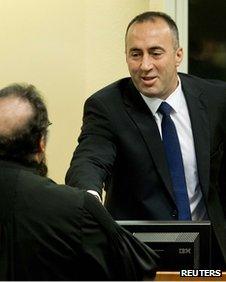Profile: Ramush Haradinaj
- Published

Ramush Haradinaj has now been acquitted of war crimes twice
Former Kosovo Prime Minister Ramush Haradinaj has become the first suspect to be tried twice for the same offences at the UN's war-crimes tribunal for the former Yugoslavia.
Both trials, which dealt with allegations from his time as a rebel commander during the 1998-1999 war, ended in acquittals.
Before he resigned as prime minister in 2005, his colourful past made him stand out among a new generation of politicians in Kosovo.
After his second acquittal in November 2012, his lawyers said he wanted to resume his political career.
Torture allegations
Born in western Kosovo in 1968, Mr Haradinaj completed military service with the Yugoslav Army.
He has said the authorities blocked his attempts to further his education in Pristina, forcing him to emigrate to Switzerland in 1989.
He spent nine years in Switzerland doing jobs that included working as a security guard at sporting events and pop concerts.
Mr Haradinaj returned to Kosovo when violence broke out between Albanian guerrillas and Serbian security forces in early 1998.
He became a regional commander of the Kosovo Liberation Army (KLA) in the west of the province. Two of his brothers were killed during the conflict.
After the conflict, Mr Haradinaj studied law at Pristina University and set up a political party, the Alliance for the Future of Kosovo.
In October 2004, his party came third in an election and formed a coalition with Kosovo's largest party.
Mr Haradinaj, 36 at the time, was chosen as prime minister.
Western diplomats were said to be impressed by his work during his tenure.
His term lasted 100 days before he stepped down to face his first trial at The Hague.
'Rightful position'
Mr Haradinaj and two close associates were accused of seeking to take control of an area in western Kosovo during the war by killing, torturing and beating Serbs or those suspected of collaborating with them.
In 2008, he and one of the associates were acquitted on 37 counts including murder, persecution, rape and torture.
The second associate was convicted of torture and jailed for six years.
At the retrial, the three men were accused variously of six counts of murder, torture and cruel treatment as war crimes.
Judge Bakone Moloto said there was no evidence that Mr Haradinaj had taken part in a plan to establish KLA control through a policy of murder and torture.
In fact, the judge said evidence suggested he had played a part in trying to mitigate the violence.
After the verdict, his lawyer Ben Emmerson told reporters: "With the consent of the people, he will soon be resuming his rightful position as the political leader of the country."
Mr Haradinaj still enjoys a widespread following within the Kosovo Albanian community.
Crowds in the capital Pristina watched the 2012 verdict on a giant screen, and celebrated his acquittal by letting off fireworks and cheering.